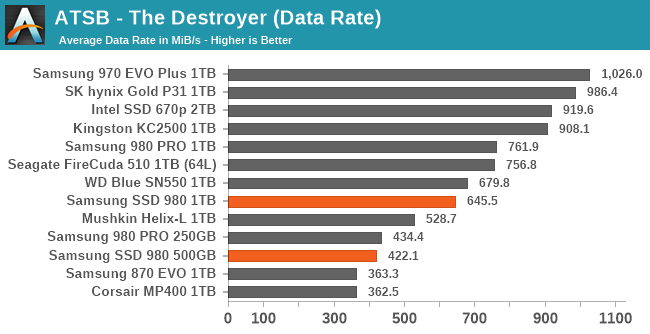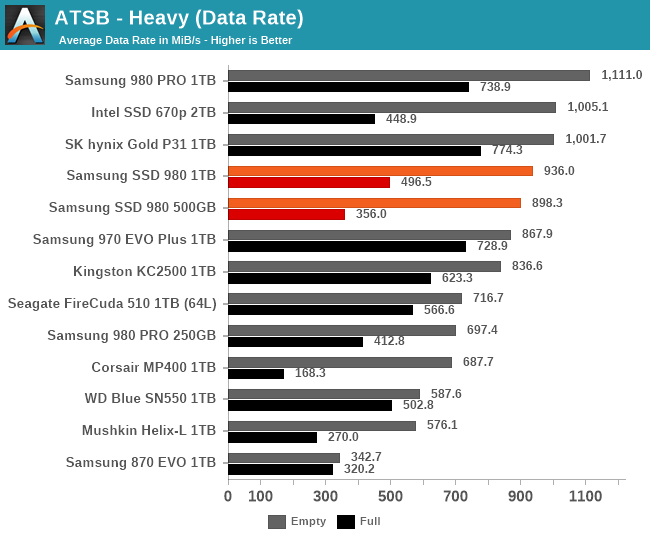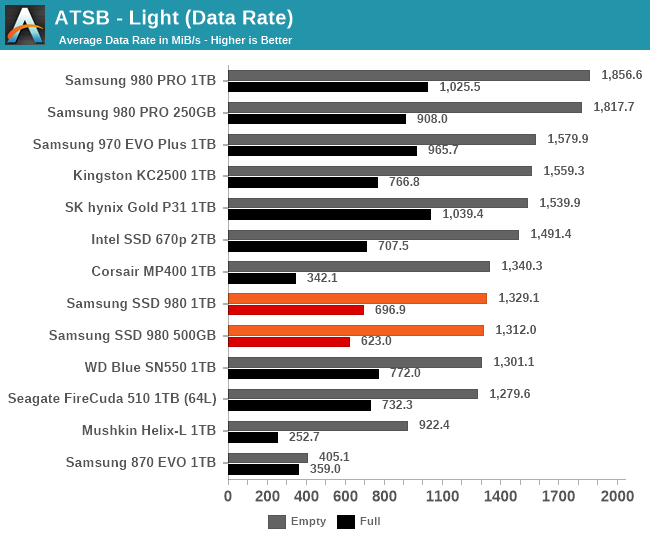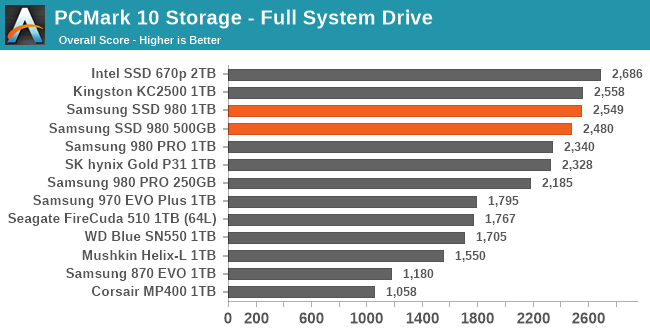The Samsung SSD 980 (500GB & 1TB) Review: Samsung's Entry NVMe
by Billy Tallis on March 9, 2021 10:00 AM ESTAnandTech Storage Bench - The Destroyer
Our AnandTech Storage Bench tests are traces (recordings) of real-world IO patterns that are replayed onto the drives under test. The Destroyer is the longest and most difficult phase of our consumer SSD test suite. For more details, please see the overview of our 2021 Consumer SSD Benchmark Suite.
 |
|||||||||
| Average Data Rate | |||||||||
| Average Latency | Average Read Latency | Average Write Latency | |||||||
| 99th Percentile Latency | 99th Percentile Read Latency | 99th Percentile Write Latency | |||||||
| Energy Usage | |||||||||
The Samsung SSD 980 turns in decent overall scores for an entry-level drive on The Destroyer, but it doesn't quite match the performance of the WD Blue SN550. In particular, Samsung's latency scores are quite a bit higher, especially for write operations. The 500 GB 980 struggles compared to the 1 TB model, but still pulls off an overall average data rate that's better than the 1TB SATA 870 EVO.
The SSD 980 does use less energy to complete The Destroyer than the 970 EVO Plus or 980 PRO did: slower and lower power worked out to lower overall energy consumption. But Samsung's performance-oriented NVMe drives have long been notable for their high energy consumption, and the SSD 980's results are nothing special in the context of other competitors on the market.
AnandTech Storage Bench - Heavy
The ATSB Heavy test is much shorter overall than The Destroyer, but is still fairly write-intensive. We run this test twice: first on a mostly-empty drive, and again on a completely full drive to show the worst-case performance.
 |
|||||||||
| Average Data Rate | |||||||||
| Average Latency | Average Read Latency | Average Write Latency | |||||||
| 99th Percentile Latency | 99th Percentile Read Latency | 99th Percentile Write Latency | |||||||
| Energy Usage | |||||||||
Moving on to the Heavy test, the Samsung SSD 980 improves its standings considerably. Performance when running the test on an empty drive is now competitive with mainstream TLC NVMe drives, including the latency scores. When the test is run on a full drive, the SSD 980's performance drops considerably, and it ends up on par with the WD Blue SN550. The 99th percentile latency scores are much higher for the full-drive test runs, but it's not an egregious outlier like a few of the other entry-level NVMe drives.
AnandTech Storage Bench - Light
The ATSB Light test represents ordinary everyday usage that doesn't put much strain on a SSD. Low queue depths, short bursts of IO and a short overall test duration mean this should be easy for any SSD. But running it a second time on a full drive shows how even storage-light workloads can be affected by SSD performance degradation.
 |
|||||||||
| Average Data Rate | |||||||||
| Average Latency | Average Read Latency | Average Write Latency | |||||||
| 99th Percentile Latency | 99th Percentile Read Latency | 99th Percentile Write Latency | |||||||
| Energy Usage | |||||||||
On the Light test, the Samsung SSD 980's performance is a step below mainstream TLC NVMe drives with DRAM, but it's not a huge difference. Even for the full-drive test runs, the latency scores all stay better than the 870 EVO SATA SSD, so there's nothing to complain about in that department. Energy consumption is a bit on the high side given that low-end drives often save quite a bit of power on light workloads, but the SSD 980 is still an improvement over Samsung's performance-oriented NVMe drives.
PCMark 10 Storage Benchmarks
The PCMark 10 Storage benchmarks are IO trace based tests similar to our own ATSB tests. For more details, please see the overview of our 2021 Consumer SSD Benchmark Suite.
 |
|||||||||
| Full System Drive | Overall Score | Average Bandwidth | Average Latency | ||||||
| Quick System Drive | Overall Score | Average Bandwidth | Average Latency | ||||||
| Data Drive | Overall Score | Average Bandwidth | Average Latency | ||||||
The Samsung SSD 980 scores very well on the Full System Drive, likely helped by the large SLC caches. Its rankings fall a bit with the Quick System Drive and Data Drive tests as more drives are also able to fit the tests within their SLC caches or pull ahead with higher sequential IO speeds.










54 Comments
View All Comments
XacTactX - Tuesday, March 9, 2021 - link
Next time I have to proof read. The performance is very good but it drops off when the drive is full of dataDigitalFreak - Tuesday, March 9, 2021 - link
@Billy All those names are related to space. Polaris and Photon are obvious. Phoenix was a Mars robot. Elpis was the Greek spirit of hope, but is also an asteroid. Maru = Kobayashi Maru? Pablo = Pablo Gabriel de León?Maybe someone at Samsung is good with obscure facts :-)
Tomatotech - Tuesday, March 9, 2021 - link
An OK-ish drive especially if it comes down slightly to a better price. Middle of the pack on everything, which is excellent for an entry level drive.The one thing I really don't like is the name. The Samsung 980 Pro is one of the best NVME drives ever made. This is ... not. The internet is full of praise for the Samsung 980, often without specifying the 'Pro' because there's been only one model. How many people are going to see that praise, whether it says 'Pro' or not, and assume it's referring to this drive?
This feels like a sneaky misleading cash-grab by Samsung Marketing for the sake of allowing PC adverts to plaster 'Contains Samsung 980 SSD!' on them.
To be honest the entry-level 980 doesn't deserve this, it's a decent drive that doesn't need cheating to promote it. If it was labelled 'Samsung SSD 975' that would be perfectly fine.
Oxford Guy - Tuesday, March 9, 2021 - link
Samsung is a particularly slimy company. First, there were the fantasy power claims for the 830 drives, claims people took at face value to promote them in forums. (Samsung, I also recall, was caught paying people to astroturf in forums.) Anandtech's power tests showed that the 830 drives used a lot more power.Then, when the planar 840 drives were exposed as being a faulty design, the company refused to replace the drives. Instead, it issued a kludgy work-around — causing the drive to re-write data as many times as necessary to continue to work around the problem (voltage drift from planar TLC I assume). The steady state performance of the 128 GB 840 was so bad HardOCP said it had worse performance than a laptop hard disk, at least in some areas.
Then, we have the company's decision to use (unfortunately legal, probably) fraud, labeling TLC and QLC drives 'MLC' — as an intentional bait and switch since the industry standard for naming has been MLC for 2 layer flash for many years — many years before Samsung started cheating with the naming. Calling QLC drives MLC is so egregious it shouldn't be legal.
Now, we have what you pointed out. Samsung loves to trick people with naming lately. Making up power consumption figures is old school, apparently.
It's anecdotal, but someone in my family bought a 1 TB 860 QLC and it has never been reliable. It even causes the entire machine to slow and have booting problems. The Inland NVME TLC drive I had him replace the Samsung with doesn't have those issues nor does the Inland TLC SATA drive that has been in the machine from the start. He did an RMA and the replacement (which probably was the original drive) had the same problem.
Oxford Guy - Tuesday, March 9, 2021 - link
Also, it's unacceptable to sell expensive televisions with undefeatable ads. That other companies do it also is no excuse.UltraTech79 - Monday, March 29, 2021 - link
Dude this naming scheme has been around for a decade. If someone is too stupid to see PRO thats on them, not Samsung.Samus - Tuesday, March 9, 2021 - link
I know this is anecdotal but I can't help but mention the third Samsung SSD in as many months sitting on my bench that failed right out of its 5-year warranty, in this case an 850 EVO. Randomly drops off the bus. These drives have serious longevity concerns and it seems to be a firmware\controller issue, as every drive uses the MEX controller (the 840's and the 850 EVO 1TB) and while I realize that controller hasn't been used in recent products, it's astonishing coincidence they are failing out of warranty obviously doesn't result in repeat customers for Samsung.Meanwhile every Crucial drive I've seen in the last decade from the C300, M4, M500\550, MX and BX series have reliability beyond Crucial's metrics and I'm talking at least 200 installed drives throughout our company.
DigitalFreak - Tuesday, March 9, 2021 - link
Both of my 860 EVOs (500GB & 4TB) have been solid. I agree that their pre-860 series drives were not that great.Samus - Tuesday, March 9, 2021 - link
I agree the newer drives seem reliable, yet the 840 Pro and 850's seemed reliable for the longest time too while recently reports across the web have shown them beginning to fail in the last few years, and Samsung has the most annoying, anti-customer tech support in the industry. Their storage support is outsourced to a 3rd party (storage tech solutions) and with ridiculous warranty qualifications (good luck finding that proof of purchase from 4 years ago) and weeks-long turnarounds. Meanwhile Intel, Toshiba\OCZ and presumably Crucial (we've never had to RMA a Crucial SSD, and most are Micron OEM drives anyway) have fairly normal RMA process from what I've heard. My experience RMA'ing a Intel SSD730 was met with a replacement of a larger capacity 545s and my experience RMA'ing a OCZ ARC100 was met with a free ADVANCED replacement of a same capacity Trion 150. The one Samsung SSD I replaced a few years ago (3 months before the warranty was set to expire) was an 840 EVO and they replaced it with AN 840 EVO. We all know the 840 EVO is one of the worst, if not the worst, SSD Samsung has ever made, you'd think they want to cycle them out of existence yet they seemingly have a stockpile of them somewhere to offload to customers and have them fail again from their write amplification issues.I realize my experience is mostly anecdotal but there are plenty of references to customers with Samsung failures, and like Apple, it's hard to actually find negative reviews due to blind loyalty, and the fact the majority of Samsung's SSD business is (was) in OEM's so customers likely didn't even know the failures were Samsung-related in the systems that failed. Probably explains why Toshiba and Hynix, along with the OEM regulars Intel and Micron have erroded their OEM wins and you see fewer and fewer Samsung SSD's in modern PC's. Admittedly this can be attributed to Samsung's premium pricing over every other competitor in an industry plagued with tiny margins.
Tomatotech - Tuesday, March 9, 2021 - link
Interesting reports. I've installed rather a lot of Samsung 2.5" SATA SSDs (various models, purchased used for cheap) for various charities and non-profits and never had any fail yet. Had an inherited Kingston 480GB SATA 2.5" fail - they sent me a replacement. A 1TB Crucial P1 NVMe m.2 (purchased new) started giving problems in one of my Macbook Airs - freezing and crashes - had to move it to my PC desktop where it's worked fine ever since.My main m.2 are a pair of ADATA XPG SX8200 1TB nvme, also purchased used, which have given magnificent service in everything I've put them in - PCs and Apple Airs and MacBooks Pro.